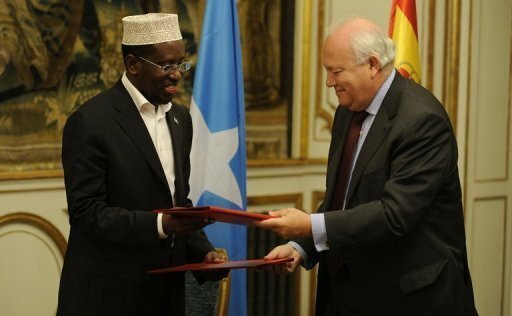 Bartamaha (MADRID):- Spain will help Somalia to develop its fishing industry in an effort to fight piracy off the African country’s lawless coast, Spanish Foreign Minister Miguel Angel Moratinos said Tuesday.
Bartamaha (MADRID):- Spain will help Somalia to develop its fishing industry in an effort to fight piracy off the African country’s lawless coast, Spanish Foreign Minister Miguel Angel Moratinos said Tuesday.
“The goal is to turn pirates into fishermen,” he told a news conference at the end of a two-day meeting in Madrid of the UN-backed International Contact Group on Somalia.
“We believe that Spain, with its great fishing tradition and capacity to provide training, can help Somalia recover a key sector that is fundamental to the country’s future.”
Spain’s environment ministry would work with Somalia’s central government to identify pilot projects that can help develop the African nation’s fishing industry, the minister said.
The waters around the Horn of Africa, especially off the Somali coast, have become a hub for piracy, making the busy shipping routes to the Suez Canal among the most dangerous in the world.
The pirate gangs that operate from towns along Somalia’s coast demand and often receive ransoms that in some cases have reached five million dollars.
Moratinos said Madrid would also contribute three million euros (four million dollars) to Somalia’s Transitional Federal Government, which is struggling to fight piracy and an offensive by Shebab Islamic extremists.
“If we want to eliminate the pirates we have to consolidate the control, stability and development of Somalia,” he said.
The waters off Somalia’s 3,330 kilometres (2,000 miles) of coastline — the longest in continental Africa — still offer a particularly fertile patch for tuna, sardines, mackerel and other lucrative species of seafood.
High-seas trawlers from as far away as South Korea, Japan and Spain have operated down the Somali coast, often illegally and without licenses, since a civil war brought down Somalia’s last functional government in 1991, according to the United Nations.
A 2006 UN report said the Somali waters have become an international “free for all” with foreign fleets from around the world plundering the country’s stocks in the absence of a functioning coastguard.
Many pirates say they are former fishermen who were forced to give up their trade because their rudimentary boats could not compete with the advanced trawlers and technologies used by their competitors from abroad.
Stepped up patrols by foreign warships off the Horn of Africa have led to a rise in arrests of suspected pirates but they are often released back to Somalia because of the legal limbo surrounding their detention.
Last year Kenya began accepting pirates detained by European and US navies for trial but in March the government said it would have to limit prosecutions to prevent the legal system becoming overburdened by the complex cases.
The Seychelles, Djibouti and Montenegro have since also agreed to put pirates detained by European forces on trial.
In a statement released at the end of the meeting, the International Contact Group “thanked those countries that currently shoulder the burden of prosecution of suspected pirates and urged further support to them in all aspects to increase their capacity”.
The group also welcomed the UN Security Council’s intent to consider setting up some kind of international or regional tribunal reserved for piracy cases as well as a place to jail convicts.
Delegates from 45 nations and international organisations attended the gathering, including Somali President Sharif Sheikh Ahmed and the top UN envoy to the country, Augustine Mahiga.
————————
Source:-AFP



